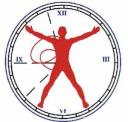 I'm a moderate late type. No, that doesn't mean I'm moderately late all the time. That's my chronotype. What is a chronotype you ask? Well, ever heard of the term circadian rhythm? How about entrainment and zeitgebers? Sounds complicated? In a sense, they are. Which is why it is important to study it. Especially since it influences our everyday lives. Let me explain.
I'm a moderate late type. No, that doesn't mean I'm moderately late all the time. That's my chronotype. What is a chronotype you ask? Well, ever heard of the term circadian rhythm? How about entrainment and zeitgebers? Sounds complicated? In a sense, they are. Which is why it is important to study it. Especially since it influences our everyday lives. Let me explain.Circadian rhythm is what we normally call our body clock. It is essentially a set of rules our body follows in a given 24-hour cycle. It determines when we wake up, when we sleep, and when we are most alert. It explains why some prefer to work at night and some during the wee hours of the morning. Now our biological clock is mostly self-sustained, however this can be adapted or entrained. Entrainment is when we adjust the clock based on external cues. These external cues are also called zeitgebers (German for "time-givers"), the most potent of which is bright light. Normally, your internal day-night cycle should coincide with your external day-night cycle, but sometimes this is disrupted by a different social schedule, like for nurses or call-center agents for example. The relationship between our external and internal cycle is called the phase of entrainment. The individual variation in our phase of entrainment is called the chronotype.

To date, many studies have been done on the different chronotypes of various populations, but no such data exist for Filipinos. This is an important step if we are ever to understand how it works and how the different sleep principles apply to us. This is the work being undertaken by PhilSHIFT. PhilSHIFT is an interdisciplinary group that brings together researchers from UP Manila--Prof. Maria Eliza Aguila of the UP College of Allied Medical Professions, Prof. Gayline F. Manalang Jr. of the UP College of Public Health, and Dr. D. Darwin Dasig of the College of Medicine, along with a number of researchers from the Ludwig Maximilian University - Munich Institute of Medical Psychology, led by Prof. Till Roenneberg, MD, and Eduardo Mendoza, Ph.D. This institution has made groundbreaking contributions in this field.
What is this to us? Well, we can help by answering the PhilMCTQ. This is an online questionnaire that helps us understand the individual differences in the circadian clock and its underlying complexity through a few simple questions on sleep during work days and free days. The questions are simple, it won't take you more than 5 minutes to fill out. Best of all, you will receive feedback through email on your results after answering the questionnaire. I trust that you will find this information interesting.
So, what is your Chronotype? Visit http://www.bioinfo.mpg.de/thewep and find out today. (And please, feel free to invite your friends and family to answer the questionnaire as well. Also, you might want to read this article to learn more about this initiative.)
PS This was initially published at Manilafied.com which has been shut down indefinitely. Permit me to leave you with some updates from the authors:
After a year online at TheWep, PhilMCTQ (our questionnaire) has already gathered about a thousand Filipino respondents, and we mean to do preliminary analysis of the results soon. PhilSHIFT, however, hope to get 3,000 more Filipinos to answer the survey, our target being at least 4,000 respondents. On March 11th, 2010 (Friday), the PhilSHIFT Research Group shall have a workshop, during which we hope to give an update on the project and discuss shift work research in the Philippines. Aside from members of PhilSHIFT, representatives of the call center industry will also be invited to talk about current state of affairs and possible research areas.This workshop is open to all interested, and will be held at the College of Public Health, University of the Philippines Manila. Those interested to attend may get in touch with Professor Gayline F. Manalang Jr. through gfmanalangjr[at]post.upm.edu.ph

